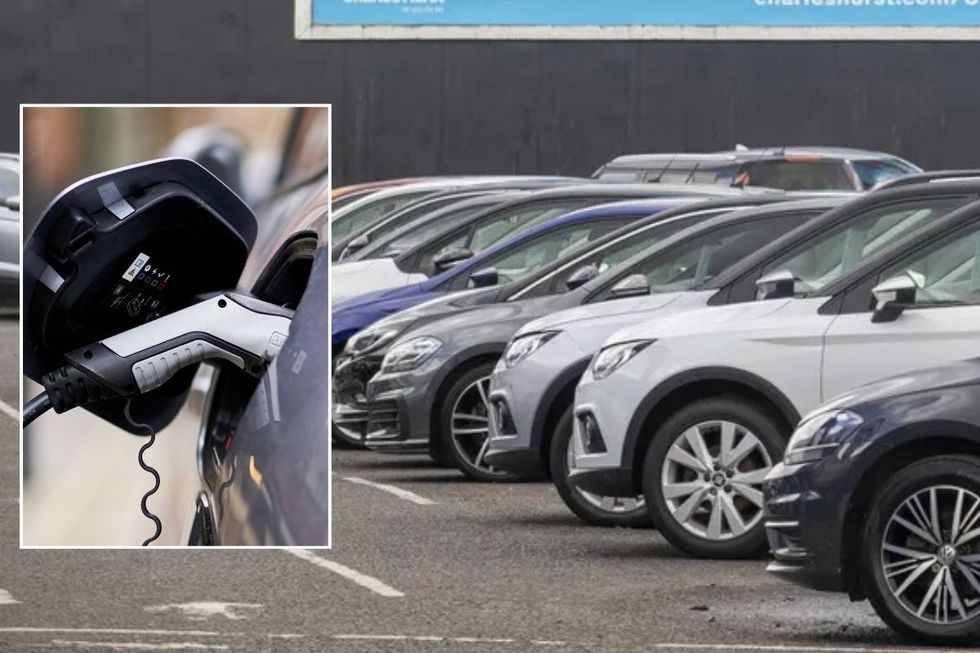WATCH: Rachel Reeves says she will continue to support the purchasing of electric vehicles
GB NEWS
'You'd be forgiven for thinking that the ICE car phase-out would mean cheaper electric vehicles'
Don't Miss
Most Read
Trending on GB News
New car prices in the UK are set to soar dramatically in the coming years, with electric vehicles more than double in price according to new data.
Research suggests that electric vehicles could face a staggering 103 per cent increase in price by 2035, while petrol and diesel cars could also rise by 46 per cent.
The findings reveal unprecedented price hikes that will significantly impact British motorists over the next decade.
Despite Government initiatives pushing for electric vehicle adoption, the research shows that one in four UK drivers believe they will still be driving petrol vehicles in 2030.
Do you have a story you'd like to share? Get in touch by emailingmotoring@gbnews.uk

Electric car prices are projected to soar by more than 100 per cent in the next 10 years
PA/GETTY
The stark projections come amid rising inflation rates and an unstable world economy, with Google Trends data showing searches for "car costs in 10 years" up by 367 per cent worldwide in the last quarter of 2024.
The research indicates that electric vehicles will become £20,500 more expensive by 2035, pushing their average price to £65,000.
Internal combustion engine vehicles will see a £16,000 increase in the same period.
These dramatic rises will position the UK as the 96th most expensive country globally to purchase a car by 2035.
The shift is particularly significant given that more than two in five Britons (43 per cent) say they won't consider switching to an electric vehicle for their next purchase.
Under the Zero Emission Vehicle mandate and new Government regulations, however, no new petrol or diesel cars will be sold in the UK after 2030. This will force those wanting to drive traditional vehicles to rely on the second-hand market.
Several key factors are driving these unprecedented price increases in both electric and traditional vehicles.
The ZEV mandate, already implemented in the UK and other major markets, requires manufacturers to ensure 28 per cent of new car sales are EVs by 2025, rising to 52 per cent in 2028 and 80 per cent by 2030.
Changes to fuel duty and road tax will also impact costs, with the current fuel duty freeze set to end and EV road tax exemptions being scrapped in April 2025.
Rhydian Jones, motoring expert at Confused, said: "You'd be forgiven for thinking that the ICE car phase-out would mean cheaper electric vehicles. But EVs are actually also likely to experience a price hike of around 103 per cent over the next decade. Going from around £32k in 2019 to £65k in 2035.
Northern European countries are facing the steepest car price increases, with Danish motorists facing costs of £96,000 for electric vehicles and £76,000 for traditional cars.
Norway follows closely behind, with projected prices of £93,000 for EVs and £73,000 for ICE vehicles.
LATEST DEVELOPMENTS:

Electric car sales are expected to grow massively over the coming years
GETTYThe higher prices in northern hemisphere countries are attributed to several factors, including high import duties and strict vehicle emission taxation.
Dan Caesar, CEO of Electric Vehicles UK (EVUK), fired back at the research, calling it "economically illiterate and fuelled by denial".
He added: "Not only are some used EVs already cheaper to buy than petrol equivalents, but they can also save ~£1,000 per year on fuel costs alone, not to mention lower running costs.
"It looks increasingly likely as the world switches to all-electric, that petrol cars and the petrol we put in them, will become increasingly expensive as combustion becomes a sunset technology."








